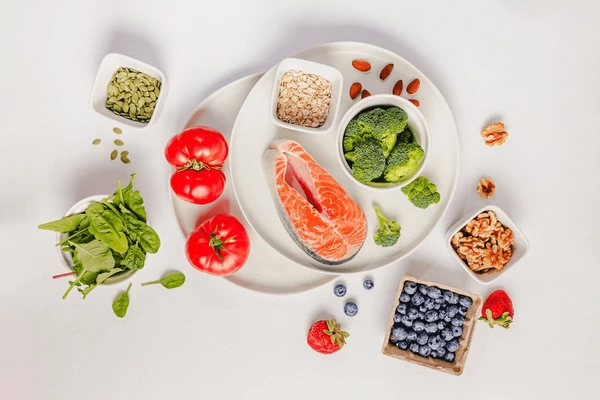Heart disease remains one of the primary causes of death globally, making heart health a critical focus for long-term well-being. A heart-healthy diet is essential in preventing cardiovascular diseases, including heart attacks and strokes. By prioritizing nutrient-rich foods that are low in cholesterol, individuals can significantly reduce the risk of these life-threatening conditions while promoting overall heart health.
Cholesterol, a type of fat in the bloodstream, plays a crucial role in the body’s cellular function. On the other hand, too much low-density lipoprotein (LDL), sometimes known as “bad” cholesterol, can cause plaque to accumulate in the arteries, raising the risk of heart attacks. On the other hand, high-density lipoprotein (HDL), or “good” cholesterol, helps clear excess LDL from the bloodstream, reducing the risk of cardiovascular complications and promoting a healthier circulatory system.
Diet plays a vital role in cholesterol management. Consuming foods high in saturated and trans fats can elevate LDL cholesterol levels, leading to potential health risks. However, incorporating fiber-rich foods, healthy fats, and certain key nutrients can help lower LDL and increase HDL, thereby improving heart health. More details below;

1. Key Nutrients for Lowering Cholesterol
Soluble fiber plays a crucial role in lowering cholesterol by binding to it within the digestive system, preventing cholesterol from being absorbed into the bloodstream. Consistently consuming soluble fiber can help reduce LDL (low-density lipoprotein), also known as “bad” cholesterol, which is a key factor in heart disease. Foods rich in soluble fiber also promote overall heart health by supporting healthy digestion and blood sugar control. Excellent sources of soluble fiber include oats, beans, lentils, barley, and a variety of fruits such as apples, citrus, and berries.
Omega-3 fatty acids are another key nutrient for heart health, as they help lower triglycerides and reduce inflammation in the body, which are both contributors to high LDL cholesterol. These fats do not only help with cholesterol management but also reduce the risk of developing heart disease. Omega-3 fatty acids are found abundantly in fatty fish like salmon, mackerel, and sardines. For those following a plant-based diet, omega-3s can also be sourced from flaxseeds, chia seeds, and walnuts, which provide essential heart-healthy fats.
Healthy fats, particularly monounsaturated and polyunsaturated fats, are excellent alternatives to saturated fats, which can increase cholesterol levels. By replacing unhealthy fats with these healthier options, you can lower LDL cholesterol while maintaining or even increasing HDL (high-density lipoprotein), the “good” cholesterol that protects heart health. Olive oil, avocados, nuts, and seeds are rich in these beneficial fats and can be easily incorporated into everyday meals as substitutes for less healthy fat sources like butter and margarine.
Antioxidants are essential in the fight against oxidative stress and inflammation, two key factors that can lead to heart disease and cholesterol imbalances. Antioxidant-rich foods not only support cholesterol management but also protect the body from the damage caused by free radicals, which can contribute to cardiovascular issues. Including foods like berries, dark leafy greens (such as spinach and kale), and brightly colored vegetables like carrots and bell peppers ensures you get plenty of heart-protective antioxidants in your diet.
Incorporating these key nutrients—soluble fiber, omega-3 fatty acids, healthy fats, and antioxidants—into your daily meals is a powerful way to lower cholesterol and enhance heart health. By making small adjustments to your diet, such as choosing whole grains over refined carbohydrates, adding fatty fish or plant-based omega-3 sources, and focusing on antioxidant-rich produce, you can take proactive steps toward managing cholesterol and reducing the risk of heart disease.
2. Heart-Healthy Cooking Tips
Reducing saturated fats is essential for lowering cholesterol and improving heart health. High-saturated fat foods like fatty meats, full-fat dairy products, and processed snacks should be limited, as they can raise LDL cholesterol levels. Instead, opt for lean protein sources such as chicken, turkey, and fish, or plant-based alternatives like beans and tofu. Additionally, avoiding processed and fried foods, which often contain harmful trans fats, is crucial, as these fats not only elevate LDL cholesterol but also reduce beneficial HDL cholesterol. Prioritizing lean and plant-based proteins helps keep cholesterol in check.
The way you cook your food also plays a vital role in managing cholesterol. Instead of frying foods in butter or oil, which adds unhealthy fats, try heart-healthy cooking methods like grilling, steaming, or baking. These methods help retain the nutrients in food while minimizing fat intake. Seasoning meals with herbs, spices, and citrus instead of salt is another effective strategy, as reducing sodium intake helps manage blood pressure, which is equally important for maintaining a healthy heart.
Incorporating more whole grains and vegetables into your diet is another excellent way to support cholesterol management. Whole grains such as quinoa, brown rice, and whole wheat are high in fiber, which helps reduce LDL cholesterol levels. Vegetables, being naturally low in fat and packed with vitamins, minerals, and fiber, offer numerous heart-health benefits. Creative ways to add more vegetables to your meals include making them the base of stir-fries, adding them to salads and soups, or serving them as sides, ensuring you get more heart-healthy nutrients every day.
3. Heart-Healthy Recipes for Breakfast
Starting your day with heart-healthy recipes like oatmeal with flax seeds and fresh berries can help lower cholesterol and boost overall wellness. Oats are rich in soluble fiber, which helps reduce LDL cholesterol, while flaxseeds add omega-3 fatty acids to support heart health. Fresh berries, packed with antioxidants, provide additional heart protection and a burst of flavor. For a nutritious breakfast, simply cook rolled oats with water or almond milk, then top with ground flaxseeds and a handful of fresh berries for a satisfying, cholesterol-lowering meal.
Avocado and egg toast on whole grain bread is another delicious and heart-healthy breakfast option. Avocados provide heart-healthy fats that can help lower LDL cholesterol, while eggs offer a good source of protein. Whole grain bread adds fiber to the meal, further supporting cholesterol management. To prepare, toast a slice of whole grain bread, mash a ripe avocado on top, and finish with a poached or scrambled egg for a balanced and tasty way to start your day.
For a quick, nutrient-packed option, try a smoothie made with spinach, chia seeds, and almond butter. Spinach offers antioxidants and fiber, chia seeds are rich in omega-3s, and almond butter provides healthy fats, all of which contribute to lowering cholesterol. Blend these ingredients with almond milk and your favorite fruit for a creamy, heart-healthy smoothie that’s perfect for on-the-go mornings.
4. Heart-Healthy Recipes for Lunch
Quinoa salad with avocado, black beans and corn is a great choice for a heart-healthy lunch. Quinoa is a whole grain packed with protein and fiber, essential for lowering cholesterol. Avocados contribute heart-healthy fats, while black beans add extra fiber to promote better cholesterol management. To prepare, mix cooked quinoa with diced avocado, black beans, and corn, and finish with a squeeze of lime juice for a refreshing and nutritious salad that supports heart health while keeping you full and energized.
Lentil soup with vegetables and olive oil is another excellent choice for a cholesterol-lowering lunch. Lentils are rich in soluble fiber, which helps reduce LDL cholesterol, and olive oil provides monounsaturated fats that promote heart health. This hearty soup is both comforting and filling, making it a great option for a nourishing meal. To make it, simmer lentils with vegetables like carrots, celery, and onions, then drizzle with a touch of olive oil for added richness and health benefits.
Grilled salmon with a lemon-dill yogurt sauce is a delicious way to incorporate omega-3 fatty acids into your diet, which are known for reducing cholesterol and supporting heart function. The light and tangy yogurt sauce adds flavor without introducing unhealthy fats, making this dish both tasty and heart-friendly. Simply grill the salmon and prepare a sauce by mixing Greek yogurt with fresh lemon juice and dill. Serve together for a flavorful, balanced, and heart-healthy lunch option.
5. Heart-Healthy Recipes for Dinner
For a heart-healthy dinner, baked chicken with steamed vegetables and brown rice offers a balanced and nutrient-dense meal. Lean chicken is low in unhealthy fats, making it a great source of protein for cholesterol management. Pairing it with fiber-rich brown rice and steamed vegetables like broccoli or carrots enhances the meal’s overall nutritional value. To prepare, season the chicken with herbs and bake it, steam your chosen vegetables, and serve alongside brown rice for a simple yet satisfying dinner that supports heart health.
Stir-fried tofu with broccoli and cashews is another heart-friendly dinner option packed with plant-based protein and healthy fats. Tofu is a cholesterol-lowering protein source, while broccoli offers plenty of fiber, and cashews provide heart-healthy fats. Stir-frying these ingredients in a small amount of olive oil ensures that the meal is both flavorful and low in unhealthy fats. This dish is easy to prepare—just stir-fry tofu with broccoli and cashews for a delicious, nutrient-rich dinner that supports a healthy heart.
Stuffed bell peppers with ground turkey and quinoa is a flavorful and hearty meal that combines lean protein, fiber, and essential vitamins. Ground turkey is a lean meat option that helps lower cholesterol, while quinoa adds fiber to aid in cholesterol control. Bell peppers not only serve as the vessel for this dish but also contribute a variety of nutrients. To make it, stuff bell peppers with a cooked mixture of ground turkey, quinoa, and your preferred spices, then bake until the peppers are tender for a filling, heart-healthy dinner.
6. Heart-Healthy Snacks and Desserts
Almonds and walnuts are excellent heart-healthy snacks due to their high content of fiber, protein, and beneficial fats. These nuts are particularly effective in lowering LDL cholesterol and promoting overall heart health when consumed regularly in moderation. A small handful of either almonds or walnuts can make for a satisfying and nutritious snack that keeps you full while supporting cholesterol management and cardiovascular wellness.
Apple slices with peanut butter are another delicious snack option that helps with cholesterol control. Apples provide a good amount of fiber, which is essential for lowering LDL cholesterol, while peanut butter contributes healthy fats and protein that aid in maintaining energy levels and promoting satiety. Simply slice an apple and pair it with a tablespoon of natural peanut butter for a tasty, sweet, and heart-healthy snack.
For a more indulgent yet heart-healthy dessert, try dark chocolate paired with berries. Dark chocolate is rich in antioxidants known to improve heart health, and when combined with berries, which are also packed with antioxidants, this dessert offers both flavor and nutritional benefits. Enjoy a piece of dark chocolate with a handful of fresh berries for a guilt-free treat that satisfies your sweet tooth while protecting your heart.

Conclusion
A heart-healthy diet is essential for managing cholesterol levels and reducing the risk of heart disease. By focusing on foods rich in soluble fiber, healthy fats, and antioxidants, and using cooking methods that minimize unhealthy fats, you can support long-term heart health. Recipes that incorporate these key nutrients provide delicious and practical ways to nourish your body and promote better cholesterol levels.
Consistency is key in maintaining a heart-healthy diet. It’s important to make these healthy eating habits part of your everyday routine to see lasting benefits. Choosing whole grains, plant-based proteins, and more fruits and vegetables on a daily basis can help prevent cholesterol buildup and reduce the risk of heart disease.
Trying new heart-healthy recipes can keep meals interesting and sustainable. With commitment and creativity, you can manage your heart health through diet, enjoying delicious meals while protecting your cardiovascular system for the long term.




